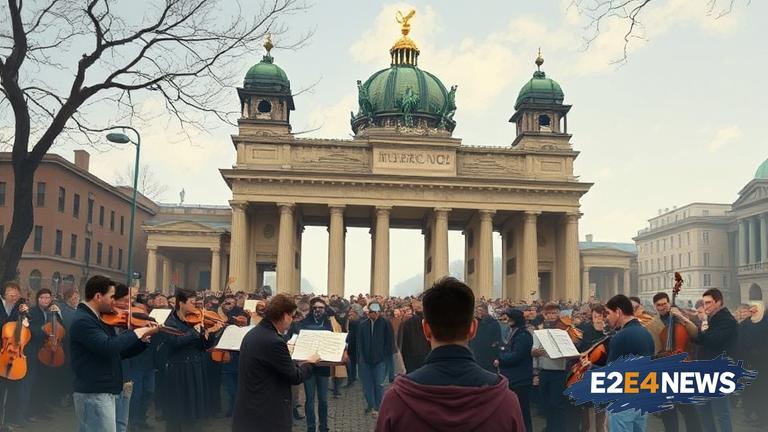The Bard College Orchestra, led by conductor Leon Botstein, performed a historic concert at the Zeppelinfeld in Nuremberg, Germany, where Hitler’s infamous rallies took place during the Nazi era. The orchestra chose to play Felix Mendelssohn’s music, a Jewish composer whose works were banned by the Nazis. This powerful gesture aimed to reclaim the site and promote unity, tolerance, and reconciliation through music. The concert was a significant event, marking a new chapter in the site’s history. The Zeppelinfeld, once a symbol of hatred and intolerance, was transformed into a platform for cultural exchange and understanding. The orchestra’s performance was met with enthusiasm and applause from the audience, comprising locals and visitors from around the world. The event highlighted the importance of music in breaking down barriers and fostering global understanding. By performing Mendelssohn’s music, the orchestra honored the composer’s legacy and defied the Nazi regime’s attempts to erase his contributions to the world of music. The concert also served as a reminder of the devastating consequences of hatred and intolerance. The Bard College Orchestra’s performance was a testament to the power of music to heal and unite people across cultures and borders. The event was organized in collaboration with the Nuremberg Symphony Orchestra and the City of Nuremberg, demonstrating a commitment to promoting cultural exchange and reconciliation. The concert was part of a larger initiative to revitalize the Zeppelinfeld and transform it into a hub for cultural and educational activities. The Bard College Orchestra’s visit to Nuremberg was a significant milestone in the city’s efforts to come to terms with its complex history. The orchestra’s performance of Mendelssohn’s music was a poignant reminder of the importance of preserving cultural heritage and promoting diversity. The event also highlighted the need for ongoing education and dialogue about the dangers of hatred and intolerance. By engaging with the local community and performing at the Zeppelinfeld, the Bard College Orchestra helped to promote a sense of shared humanity and responsibility. The concert was a celebration of the universal language of music and its ability to transcend borders and cultures. The Bard College Orchestra’s performance in Nuremberg was a powerful statement about the importance of arts and culture in promoting social change and reconciliation. The event demonstrated that music can be a powerful tool for healing and unity, even in the face of adversity and conflict. The concert was a testament to the enduring legacy of Felix Mendelssohn and the impact of his music on generations of musicians and music lovers. The Bard College Orchestra’s visit to Nuremberg was a significant cultural exchange, promoting mutual understanding and respect between the United States and Germany. The event highlighted the importance of international cooperation and collaboration in promoting arts and culture. The concert was a reminder that music has the power to bring people together and promote positive change in the world. The Bard College Orchestra’s performance of Mendelssohn’s music at the Zeppelinfeld was a historic event that will be remembered for years to come, serving as a powerful symbol of the transformative power of music.
